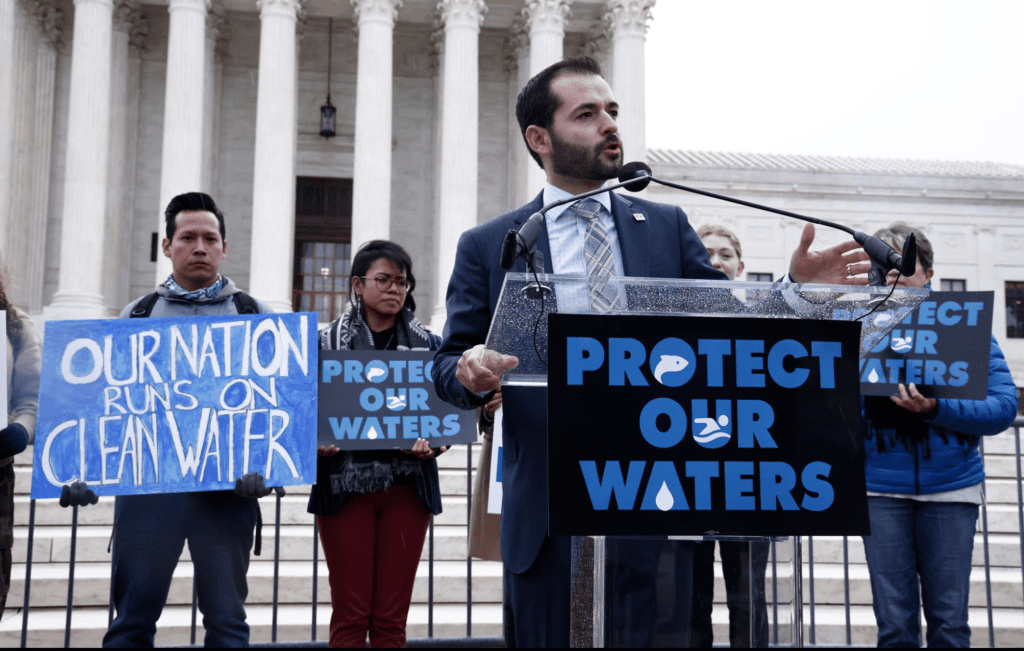
The following is a statement from Earth Justice, See the original statement at: bit.ly/3yijWVI — The Editors
“Today, the Supreme Court heard a case that could gut the Clean Water Act as we know it. Here’s why we’re worried. The question before the court puts our very health and lives at stake. Water is like the very blood in our bodies. One drop of poison, just like the actions of one selfish polluter, will taint the whole body. We can’t protect water unless we protect all water. As our partners in America’s First Nations remind us, Water is life: we must protect it.”— Legislative Director Raul Garcia
Wetlands are inextricably connected to lakes and rivers and play a crucial role in maintaining water quality. It seems obvious that you can’t protect one without protecting the other, but the Supreme Court is questioning that wisdom in a case called Sackett v. EPA. The court could use the case to blow a hole in the Clean Water Act by limiting the kinds of wetlands and streams that the Act protects from pollution as “waters of the United States.”
Eliminating these bedrock protections would have grave consequences for the health of the country’s water, as well as the communities and ecosystems that depend on it. Earthjustice has filed an amicus brief on behalf of Native tribes seeking to defend existing clean water protections.
At oral arguments on Oct. 3, the court tried on the narrow criteria the Sacketts and their polluter allies proposed for determining which wetlands are protected by the Clean Water Act. The justices repeatedly bumped up against the reality that the Sacketts’ test would not meet the law’s goals. A decision is expected in early 2023.
The Facts of the Case
Years ago, Michael and Chantell Sackett bought a lot near Idaho’s Priest Lake that included wetlands EPA had already determined were protected by the Clean Water Act.
- But the Sacketts dumped 1700 cubic yards of gravel and sand into those wetlands without applying for the requisite permit; as the owners of a construction and excavation company they surely knew better.
- When EPA discovered the unpermitted discharges, it told the Sacketts to undo the damage they caused. They sued instead, starting a legal battle that has reached the Supreme Court.
- The Sacketts are represented by the Pacific Legal Foundation, a pro-industry group that seeks to dismantle key environmental protections.
High Stakes for the Country
- The Sacketts’ lawyers and extractive industries are asking the Supreme Court to significantly narrow the range of waters that the Clean Water Act protects. That would benefit industries that want to contaminate and destroy wetlands, which play a fundamental role in safeguarding clean water.
- If the court agreed with the flawed argument of the Sacketts and their industry allies, half of the wetlands in the lower 48 states would lose their Clean Water Act protections.
- If polluters can act with impunity and without environmental review, the consequences for wetlands connected with lakes and rivers could be catastrophic. The Clean Water Act is the first and strongest line of defense protecting watersheds from pollution, and the Sackett lawsuit threatens to gut that law’s protections.
- The context of this lawsuit couldn’t be more clear or more dire – intensifying droughts are wreaking havoc on agriculture and fire containment efforts in the West and multiple cities are contending with dangerously contaminated drinking water.
New Tactic in Long Scheme to Pollute Freely
- In June of 2020, the Trump administration’s EPA weakened the definition of what constitutes a “water of the U.S.” to allow for increased pollution and construction.
- Earthjustice sued the EPA on behalf of six tribes, and in August 2021, the courts ruled in favor of Earthjustice and nixed the Trump rule, tasking the Biden administration to rework it.
- But the assault continues, and the Supreme Court’s decision to take this case is a troubling sign that the new supermajority in the country’s highest court is pursuing a deregulatory agenda with the Clean Water Act now in its crosshairs.
- The American Petroleum Institute and other anti-environmental groups have filed amicus briefs urging the court to side with the Sacketts.
What Happened at Court
- The justices struggled to reconcile the Sacketts’ and industry-sponsored arguments with the Clean Water Act’s broad language, Congress’ purpose, and with the reality that all waters are connected.
- The government’s position—and that of the environmental community—is that we should decide which wetlands the Clean Water Act protects by considering the law’s goals (to protect water quality) and the science (the degree to which wetlands are connected to other waters).
- The Sacketts want the court to rule that the law only protects wetlands that are physically indistinguishable from navigable water bodies like rivers and lakes. As even some conservative justices acknowledged, this arbitrary line would defy the text and purposes of the act, decades of consistent legal interpretation, and the science of environmental protection.
Tell your elected officials and everyone in your orbit about this case, and how much courts matter for the environment — no court more than the Supreme Court!
Tell the EPA to defend clean water
